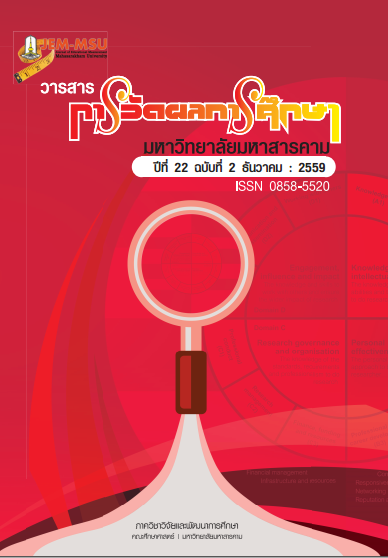Mixed - Methods Research Methodology to Develop the Quality Enhancement Program in Basic Education Institutes
Main Article Content
Abstract
The purpose of the research was to develop Quality Enhancement Program in Basic
Education using mixed methods research methodology. Particular objectives were: to
synthesize and identify Quality Indicators in Basic Education, to develop Quality Enhancement
Program in Basic Education, and to evaluate Enhancement Program effectiveness in school.
There were three phases: 1) Exploratory Design: Instrument Development Model to synthesize
and identify Quality Indicators in Basic Education 2) Two-phase Embedded Design: Experimental
Model by Qualitative Dominant to develop Quality Enhancement Program in Basic Education
3) Triangulation Design: Convergence Model to evaluate Enhance Program's effectiveness in
school. The mixed methods research was conducted in one school with cooperation from
the school principal, teachers and staff. Data were gathered qualitatively and quantitatively
by observation, query, interview, group discussion, and open forum discussion. Data were
subjected to statistical analysis to find Percentage, Arithmetic Mean, Standard Deviation and
Wilcoxon Signed Rank Test.
The research yielded that Quality Indicators in Basic Education comprised five
factors: Learner, Teacher, School Administrator, Community and School Environment, (30
main indicators, 167 sub-indicators). The Quality Enhancement Program in Basic Education
comprised five attributes: 1) Rationale 2) Purpose 3) Development Model 4) Defined
Content/Activities and 5) Six Activities of Enhancement Program. The four aspects evaluation
of Enhancement Program indicated that Utility, Feasibility, and Accuracy was at high level
(Arithmetic Mean = 4.45, 4.48 and 4.48 ) while Propriety was very high at 4.63. Teachers and
related staff's satisfaction with quality assurance and activities after implementing the
Enhancement Program was statistically significant at .05 level. After one semester of
program implementation, it was found that Utility, Feasibility, Propriety and Accuracy was at
very high level. The program usage evaluation results, according to ten Empowerment
Principles (Improvement, Community Ownership, Inclusion, Democratic Participation, Social
Justice, Community Wisdom, Evidence-based Strategies, Capacity Building, Organizational
Learning, and Accountability) were at high level.
The mixed methods research methodology to develop quality enhancement
program in basic education could help school's teachers and related staff to understand and
develop skills in developing and evaluating quality education, which should help in shaping,
improving basic education in their school.
Article Details
The content and information contained in the published article in the Journal of Educational Measurement Mahasarakham University represent the opinions and responsibilities of the authors directly. The editorial board of the journal is not necessarily in agreement with or responsible for any of the content.
The articles, data, content, images, etc. that have been published in the Journal of Educational Measurement Mahasarakham University are copyrighted by the journal. If any individual or organization wishes to reproduce or perform any actions involving the entirety or any part of the content, they must obtain written permission from the Journal of Educational Measurement Mahasarakham University.


